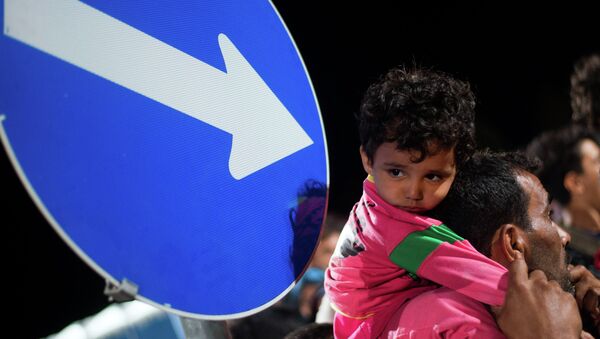As Hungary firmly closed its border with Serbia and thousands of migrants and refugees camped down in the hope of it re-opening, the United Nations Refugee agency (UNHCR) accused it of breaking the Geneva Convention on Refugees by not offering protection to the thousands of people trying to move through Hungary to get further west or north.
#Refugees locked out of Europe as Hungary closes border with Serbia. pic.twitter.com/vC83TxIWyk
— Laura Padoan (@Laura_Padoan) September 15, 2015
A spokesman for the agency was critical of other European countries closing their borders and not providing protection or safe corridors for the hundreds of thousands of people on the move.
So close to Europe but no way in on Serb-Hungarian border for Syrian refugees who have come so far. pic.twitter.com/MgyOwoitbT
— Laura Padoan (@Laura_Padoan) September 15, 2015
Melota Sunjic, west Balkans spokesperson for the UN refugee agency UNHCR, told the British Today program the agency was "very concerned" about Hungary raising a razor wire fence along its border and passing an emergency law making it illegal to tamper with or cross the fence.
"The law has been in force for 36 hours and we can see the first results already. The border has been completely closed. There is a side gate where people can present themselves to claim asylum. We know that yesterday, only 90 people were admitted to the procedure, but there was a backlog of 2,400.
"Also, the [asylum] procedure is accelerated, I mean, it's a light-speed procedure. They get their results within half an hour. There is no way how you can determine within half an hour whether someone is a refugee or not."
"Some people have been sent back and only given Hungarian papers as an explanation of why they had been rejected and they were told that they can appeal — but [only] from Serbia," she said.
#Hungary: Hundreds protest on the Serbian side, dozens of claims rejected already in so called transit zones pic.twitter.com/zGKvfD7YFA
— UNHCR Central Europe (@RefugeesCE) September 15, 2015
The UNHCR does not consider Serbia a safe country for refugees, as it does not have an accepted asylum and appeals procedure. Serbia was not prepared to process even small numbers of asylum seekers three years ago and is now overwhelmed.
Care and Protection of Children
The United Nations Geneva Convention on Refugees, dated 1951 requires:
"Governments to take the necessary measures for the protection of the refugee's family especially with a view to ensuring that the unity of the refugee's family is maintained particularly in cases where the head of the family has fulfilled the necessary conditions for admission to a particular country, [and] the protection of refugees who are minors, in particular unaccompanied children and girls, with special reference to guardianship and adoption."
The asylum procedure is designed to define whether seekers are economic migrants or refugees fleeing war zones or persecution on religious or political grounds. It is also designed to determine whether people can be sent back to safe countries.
Scenes at Horgos. Over 1000 gathered here chanting 'open open open' as Hungary border stays closed #refugees #Serbia pic.twitter.com/riy3zYJPkx
— Laura Padoan (@Laura_Padoan) September 15, 2015
The UNHCR is handing out blankets to the refugees and migrants on the Hungarian border in an effort to provide the protection it says Hungary and Serbia should be giving.
Melota Sunjic is critical of the pan-European response, which has seen deep divisions with some countries refusing to accept a distribution of refugees according to a quota system and others closing their borders completely.
"We have been urging the European Union for weeks and months now to establish safe routes for these people to be re-distributed and for all European countries to take up their responsibility," she said.


